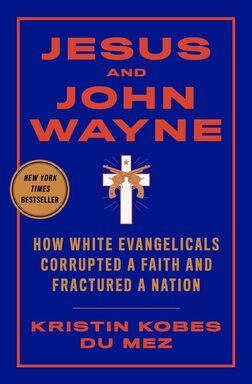|
My blog posts revolve around my interests and vocation as a historian: the intersection of history and contemporary church life, the intersection of history and contemporary politics, serendipitous discoveries in archives or on research trips, publications and research projects, upcoming conferences, and speaking engagements.
I sometimes blog for two other organizations, the Canadian Baptist Historical Society and the Centre for Post-Christendom Studies. The views expressed in these blogs represent the views of the authors, and not necessarily those of any organizations with which they are associated. |
A sobering but insightful survey of the last few generations of American white evangelicals and their view of males and leadership. Making such “leadership” necessary was the perceived threats facing the church and the nation, and only a John Wayne type of “leadership”, with guns blazing, was seen to be able to set things right. The litany of powerful male leaders that embraced a muscular Christianity – with the troubling linkage with patriarchal abuse – is cause for pause and self-analysis. That said, one is left wondering how evangelicals fared compared to other religious groups – were they the only ones who struggled with what a male (or female) was meant to be? As an aside, this is the kind of book that helps to make sense of the present. For instance, some of the troubling aspects of what we see today among American evangelicals are not anomalies. Rather, such actions have generations of precedent and are part of the DNA of the movement. Memorable Quote: “But evangelical support for Trump was no aberration, nor was it merely a pragmatic choice. It was, rather, the culmination of evangelicals’ embrace of militant masculinity, an ideology that enshrines patriarchal authority and condones the callous display of power, at home and abroad. By the time Trump arrived proclaiming himself their savior, conservative white evangelicals had already traded a faith that privileges humility and elevates ‘the least of these’ for one that derides gentleness as the province of wusses. Rather than turning the other cheek, they’d resolved to defend their faith and their nation, secure in the knowledge that the ends justify the means. Having replaced the Jesus of the Gospels with a vengeful warrior Christ, it’s no wonder many came to think of Trump in the same way. In 2016, many observers were stunned at evangelicals’ apparent betrayal of their own values. In reality, evangelicals did not cast their vote despite their beliefs, but because of them.” (3)
2 Comments
Alan Hayes
8/31/2022 12:13:01 pm
Kristin did a (remote) talk at Wycliffe a year ago, and spoke of the difficulties of writing this book. In particular, the research she did for the chapter on sexual abuse really distressed her. Of course she has had quite a bit of negative reaction from a lot of people, but she was perhaps more surprised by the number of evangelicals who found her book enlightening, and said that it explained a lot of things that they had wondered about. At Wycliffe, which historically has described itself as evangelical, it led to some conversation about whether the word "evangelical" has become so tainted by its US usages that we should get rid of it altogether. I gather that the fall issue of "Faith Today" will talk about that a bit.
Reply
Gordon Heath
8/31/2022 12:33:50 pm
Thanks Alan. That would have been a good presentation - was it recorded?
Reply
Leave a Reply. |
Archives
May 2024
|

 RSS Feed
RSS Feed
